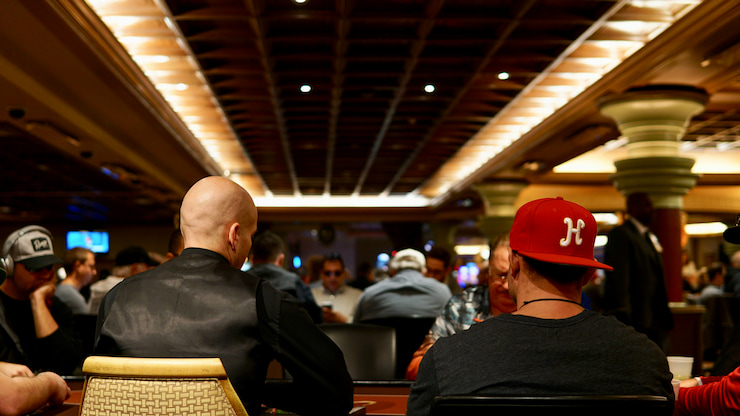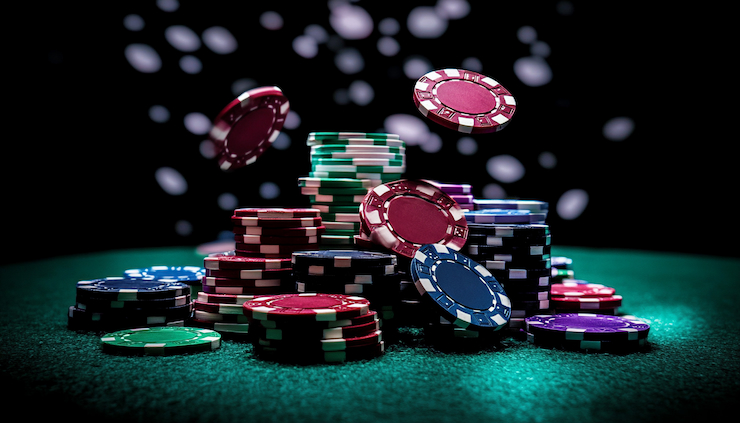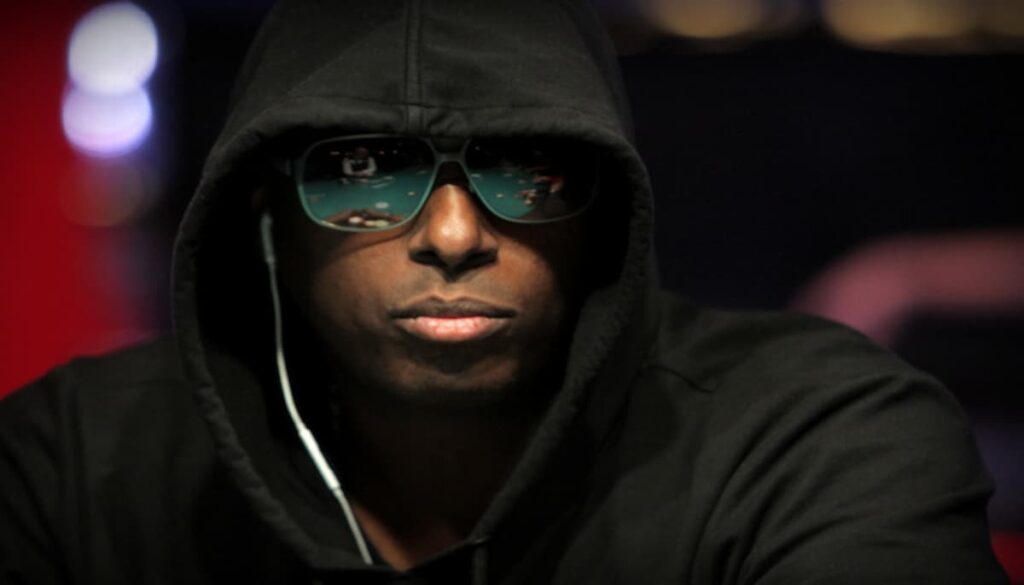If you’re new to playing live, brush up on your poker etiquette before sitting at the table. The game is packed full of unwritten rules, and the last thing you want is to be disrespectful.
Worse still, by failing to grasp basic etiquette, you might be accused of angle shooting – the most heinous of poker crimes.
We’ll teach you exactly how to behave at the poker table, whether you’ve just learned how to play Texas Hold’em or you’ve got a deep stack in a Seven Stud cash game.
- Show Full Guide

1. Don’t Angle Shoot
“Angle shooting” is the collective term for a range of tricks that, while not necessarily against the rules, are calculated to gain an edge.
Here are some notable examples of practices widely considered to be angle shooting:
- Acting out of turn intentionally
- Trying to sneak a peek at a nearby opponent’s hand
- Hiding larger denomination chips behind your stack
- Verbally declaring a better hand than you really have
- Faking to bet or raise, in order to elicit a response from an opponent
- Throwing out a single chip to call “by accident” and claiming you meant to raise
- Declaring that you’ve won at showdown before revealing a losing hand
Having a reputation as an angle shooter is not something you want, as the poker community is tight and word gets around.
It’s not just bad poker etiquette, but it’ll cost you money. Angle shooters are likely to be uninvited from home games, and may even wind up banned from card rooms.
It’s largely impossible for players to angle shoot at US poker sites like CoinPoker so it’s a great place to start and learn how a poker game runs.
2. Never Slow Roll Poker Opponents
For some strange reason, slow rolling persists, even though the community agrees that it’s one of the most egregious breaches of poker etiquette.
If you don’t already know, a slow roll is when a player deliberately delays revealing what is obviously the winning hand.
An extreme example would be if your opponent rivered a royal flush and you decided to bluff, shoving all-in. For the vast majority of players, this is a snap call situation.
However, imagine your opponent elects to slow roll, meaning you have a completely unnecessary sweat. You start to think “I might win this”, but the villain turns over the stone cold nuts.
Doesn’t feel good, right?
Professional player Shaun Deeb is famously on the record as finding slow rolling funny, and believes it’s a valid part of the game. However, most players feel that it’s disrespectful, and is definitely an example of poor poker etiquette.
3. Don’t String Bet
When betting and raising, you must move chips forward in one smooth and continuous motion. For example, if you want to raise $40, you can’t push a $20 chip over the line, then go back for a second $20.
Similarly, you’re not allowed to lift multiple chips and drop them over the line one at a time. Nor can you say something like “I call that bet and raise $40”.
The first chip you put over the line, or the first verbal declaration you make, is binding. Anything after that is an illegal string bet.
This well-established rule is designed to combat angle shooting. If it didn’t exist, you could theoretically make your raise, watch the opponent for a reaction, then add more chips.
There’s no risk of a string bet with online poker apps or websites, so you don’t need to think about it. As such, most players will forgive a mistake if you’re new to the live arena.
4. Bet and Raise Properly
On a similar note, there are two more aspects of poker etiquette that concern betting.
First of all, don’t use low-value chips unnecessarily. If you want to make it $50 to go, and you have a $50 chip, use that.
Don’t make the dealer count out 50 individual $1 chips for no reason. Doing so slows everything down, which is frustrating for your opponents, as well as the dealer.
Don’t forget, too, that tossing in a single oversized chip does not constitute a raise, but a call.
Make sure you declare any bets or raises verbally, before moving chips around. That way, nobody can accuse you of angle shooting if you make a mistake.
5. Don’t Splash the Pot
“In my club, I will splash the pot whenever the f**k I please.” – Teddy KGB (Rounders, 1998)
We all remember the famous scene, when Mike chastises the John Malkovich character for splashing the pot. There are several reasons that he told Teddy KGB off.
First of all, it’s suspicious. If you declare a raise, then immediately dump a massive pile of chips into the middle, it’s hard for others to follow the action.
Maybe you’re just excited, but how can we be sure you’re not angle shooting? Or simply cheating, by putting less in than you claimed?
Secondly, it’s really annoying for the dealer when you throw a massive pile of chips into the middle. They now have to count the entire pot to make sure you didn’t underbet before play can continue.
If there is no designated dealer, the players will have to sort it out themselves. This just slows the game down and could even lead to arguments. So don’t splash the pot.
6. Don’t Tank Unnecessarily
Tanking is a scourge of the modern game. There always seems to be one guy in a hoodie, shades and headphones who “thinks” for ages every hand, before making a routine fold.
Everyone understands that, from time to time, you’ll be faced with a tough decision. If all of your chips are at stake, it’s accepted that you might need to think long and hard. That’s why the casinos give you a time bank, for example.
It’s even acceptable to fake a decision if you’re facing a re-raise. After all, poker is as much about table image as anything. We all get it.
The problem comes when you consistently sit in silence for minutes at a time, for most of your hands. You’re not clever, you’re just ruining it for everyone.
7. Organize Your Chips
We’ve touched on this already, but it’s important to arrange your chips carefully. This becomes increasingly relevant as tournaments enter their later stages, and piles of chips start to form in front of the bigger stacks.
First of all, there’s the angle shooting aspect, where someone seeking to gain an edge might deliberately hide their biggest chips. The idea is to pretend you aren’t as strong as you really are.
However, that’s not the only reason that stacking chips correctly is an important part of poker etiquette.
By neatly arranging chips into piles of the same denomination, players can size up chip stacks a lot more easily, leading to quicker decisions. Similarly, dealers can count things much faster, which helps the game to flow.
A huge no-no in poker is sharing your cards with anyone else. Don’t show them to spectators on the rail, or to other players at the table, whether they’re involved in the hand or not.
Depending on where you’re playing, sharing the contents of your hand may be considered much worse than bad poker etiquette. It’s often against the rules, meaning a punishment may follow.
In addition, if other players are involved in a hand, keep your mouth shut. Especially if it’s a long and drawn out hand with lots of chips at stake.
There are clearly some big decisions to be made, and the players involved don’t need to hear your analysis. Not only is it an unnecessary distraction, but you could be influencing their actions, which is highly unethical.
9. Cards on the Table
This is a simple piece of poker etiquette that’s often forgotten about. Your cards should remain on the table at all times.
You’re obviously allowed to lift them in order to see what you have. But usually, players simply pinch the corner of each card, helping to keep them out of sight of your opponents.
If you really have to lift them off the table entirely in order to look, it’s allowed. But you can’t continually hold them in the air, like you’d see in a badly-acted movie.
They must go straight back to the table, so the dealer and other players can easily see who is left in the hand.
10. Respect the Staff
This one should really go without saying, but try to be respectful while seated at the table.
Even if you’re taking a beating in the game, there’s no need to lash out at other people – especially not the members of staff.
Remember, the dealer has no control over the cards. They’re not trying to make you lose on purpose. Even if you’re behaving badly and they now want you to lose, there’s literally nothing they can do to influence events.
Similarly, the waitress bringing you a drink is just doing her job. The Tournament Director is only applying the rules. It’s not all a massive conspiracy to gang up on you, so keep your emotions in check and be polite.
And, if you’re having a good time, consider leaving tips.
11. Pay Attention
Many of poker’s unwritten rules are about keeping the game flowing. That’s certainly the case here.
Because live poker tends to be much slower than online games, it’s really important that you stay aware of what’s going on. If you don’t realize it’s your turn to act because you’re messing around on your phone, everyone’s going to be annoyed with you.
As annoying as it is when players are consistently tanking, at least you can attribute that to some sort of strategy. Obliviousness, on the other hand, is just disrespectful to everyone at the table.
12. Calling the Clock
If someone is taking too long over a decision, you’re well within your rights to call the clock. That means getting the officials involved and forcing the player to decide what to do.
It’s a well-known rule, and there’s nothing wrong with calling the clock per se. However, it’s a major breach of poker etiquette to call it too quickly.
It’s imperative that you give your fellow players enough time to think, especially if it’s obviously a crucial hand in an important event.
There’s no hard and fast rule about how much time is acceptable. Generally, you’ll want to ask yourself whether or not you’ve ever taken that long in the past, and if it was justified.
In other words, apply the “Golden Rule” of doing unto others as you’d have them do unto you.
Before calling in the officials, look around the table and see how everyone else is reacting. It shouldn’t be too difficult to reach an unspoken consensus about whether or not it’s been too long.
13. Don’t Hit and Run
One of the least clear cut aspects of poker etiquette is the “hit and run”. This is where a player buys into a cash game, quickly wins a monster pot, then cashes out their chips right away.
Of course, there are no rules against this. The whole point of a cash game is that you can dip in and out as you please.
But it’s quite frustrating to sit grinding for hours, only for someone to drop in for a few hands and take your chips.
Immediately disappearing without offering even a small chance of winning them back is very much frowned upon.
An acceptable compromise would be to stay for at least one full orbit of the table before packing up and leaving. But there are certainly no rules set in stone on this.
14. Never Tap the Glass
All around the world, from poker in Singapore to the USA, there’s an accepted piece of poker wisdom: don’t tap on the tank.
If there’s a fish at the table and they’re making terrible plays against you, don’t draw attention to it. Telling them off because they made a bad play is counter-productive for several reasons.
First of all, don’t you want to face bad opponents? Why are you trying to improve their game and make it harder for you to win?
In addition, you could embarrass them, in which case they might leave. After all, poker is supposed to be fun. Nobody wants to sit and be berated by strangers.
Tapping on the glass is just bad for the entire poker ecosystem – don’t do it.
15. Take the Ws and the Ls
Finally, to truly master the game of poker, you have to learn to take the rough with the smooth. Genuinely reacting the same way to a bad beat as a victory is the ultimate achievement.
If someone sucks out on you, take it on the chin. Nobody wants to hear you whining about it for the next hour, bringing down the mood.
Equally, if you win a big hand, it’s bad etiquette to jump up and run around screaming and shouting. If you’re doing that, you’d better make sure it’s the final hand of the WSOP Main Event.
In short, don’t over celebrate and keep your hard luck stories to yourself.
Conclusion
As you can see, good poker etiquette is mostly about common sense.
There are one or two unwritten rules you may not have encountered before, but there’s nothing to fear.
Experienced players can usually tell when someone’s new to live poker and has made an honest mistake. As long as you’re trying to be respectful, you’ll be just fine.







